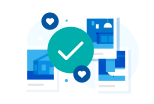What is a Conventional Mortgage?

Looking for information about types of home loans for your manufactured home purchase? Check out our post to learn more about what a conventional mortgage is.
We know first-time home buyers often have the most questions about the financing part of the home buying process, which usually includes evaluating the different types of mortgages and choosing one that best fits your specific needs. FHA, VA and USDA are some types of mortgages you may have heard of, but today we’re going to look at one of the most common types: a conventional mortgage, which is also known as a conventional loan.

Key Takeaways
- A conventional loan is one of the most common type of mortgages and is through private lenders rather than guaranteed by a government program.
- Conventional loans are usually either conforming or non-conforming, and both types have different limits and requirements for lending but can require a higher credit score.
- Some typical benefits of a conventional mortgage for borrowers include more flexibility than government-insured programs, less cost over time and lower interest rates.

What is Considered a Conventional Mortgage?
A conventional mortgage is a loan that is not through a specific government program and is offered by banks, credit unions, mortgage brokers or online lenders. Conventional loan terms and rates can vary significantly among lenders because the lenders don’t have to stick to the specific guidelines a government program loan requires. It’s important to consider your options and make sure you understand the terms that are being offered when you are considering a conventional mortgage.
Conforming and non-conforming are the two main types of conventional loans. Conforming loans have limits on the maximum loan amounts that are set by the government, while other rules for these types of loans are set by Fannie Mae or Freddie Mac. As far as non-conforming loans go, eligibility, pricing and features depend on the lender, so it’s typically best to consider several lenders before you make a final decision.
The Consumer Financial Protection Bureau is a great resource to help you learn more about loans. We recommend getting started by checking out their home financing terms guide. And remember, the choice of lender is always up to you.
Typical Conventional Mortgage Requirements
One of the requirements of a conventional loan is a down payment, which in some situations could potentially be as low as 5%. If your down payment is less than 20%, there is a good chance that your lender will require you to have private mortgage insurance. PMI is a risk-based insurance, so the premium will depend on factors like your credit and the amount of your down payment.
Here are some examples of the kinds of documents you may need when you’re applying for a conventional mortgage loan:
- A pay stub from within the last 30 days
- Two years of federal tax returns if you’re self-employed or have rental properties or non-salary income (from retirement, pension, etc.)
- Your two most recent bank statements
- Two years of W-2 statements
- Social Security, retirement and/or pension award letters and 2 years of 1099s, if applicable
- Proof of your identity, typically a drivers’ license or non-driver ID
- Your Social Security number

Advantages of a Conventional Mortgage
Conventional mortgages offer several potential advantages to home buyers, especially if your household doesn’t have a lot of debt. Conventional loans typically cost less over the life of the loan than FHA loans and have lower interest rates. You’ll also be able to choose between a fixed rate or adjustable rate. However, conventional loans can be more difficult to get partly because they often have higher credit score requirements. Conventional loan financing may also not be available for manufactured homes unless land is also included.
It’s important to understand that there are multiple loan options available to home buyers and the different options offer their own potential advantages and disadvantages. Whether you are a first-time or experienced home buyer, there’s a lot of information you’ll want to gather. So, it’s important to do your research and compare your lender and loan options so you can make sure you select the one that is the best fit for your situation.
From budgeting tips to info on the tools Clayton offers to help make your home buying journey easier, you can learn more today by checking out our Clayton Studio blog.
Fannie Mae and Freddie Mac are trademarks of their respective owners.
Are you ready to find your dream home?
Start shopping now or find a home center in your area to learn more about Clayton Built® home options.By entering your email address, you agree to receive marketing emails from Clayton. Unsubscribe anytime.
© 1998-2025 Clayton.

